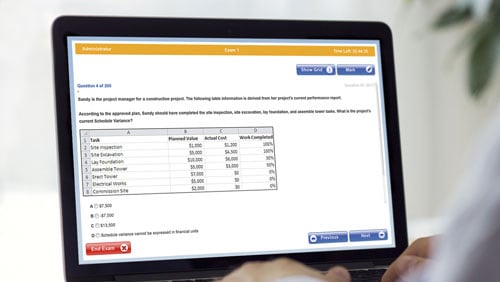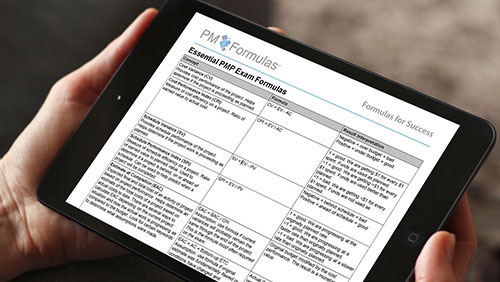Answer All PMP® Exam Question on the PMP Certification Exam
 The Project Management Professional (PMP)® exam is a 200-question multiple choice exam. Each question has four possible answers: A, B, C, or D; each correct answer is worth one point towards passing the PMP® Exam. If you don't select an answer then it is considered incorrect. Your goal is to answer every single PMP exam question on even if you have to guess.
The Project Management Professional (PMP)® exam is a 200-question multiple choice exam. Each question has four possible answers: A, B, C, or D; each correct answer is worth one point towards passing the PMP® Exam. If you don't select an answer then it is considered incorrect. Your goal is to answer every single PMP exam question on even if you have to guess.
Here is one method to help find the best answer among the four presented:
- Start out by reading the question completely, make sure that you understand it, and that you can distinguish between the important facts and the extraneous information;
- Learn to ignore those facts that do not relate to the question;
- Then read all four possible answers; usually two of the four will be very obviously incorrect and can be eliminated; and
- Finally, weigh the two remaining questions against each other and make your choice. Also remember, that you will have a checkbox that allows you to mark any questions you are uncertain of and want to come back and review later.
Continue Reading
What is the difference between PMP® Contact Hours and PDUs?
 If you are working toward a Project Management Professional (PMP)® certification, you may have wondered “What is the difference between Contact Hours and Professional Development Units (PDUs)?”
If you are working toward a Project Management Professional (PMP)® certification, you may have wondered “What is the difference between Contact Hours and Professional Development Units (PDUs)?”
The main difference between Contact Hours and PDUs is that Contact Hours are accumulated prior and PDUs after your PMP® Exam. Before the exam you need 35 Contact Hours and after you become a certified PMP, you will need to accumulate 60 Professional Development Units (PDUs) every three years to keep your certification current. However the content of the training can be identical.
Continue Reading
The Secret Of Creating Your PMP® Brain Dump
 There’s no better catalyst for self realization than taking the Project Management Professional (PMP)® exam. I’m kidding you, of course, but there is some truth in that the PMP exam day will illuminate that “you don’t know what you don’t know.”
There’s no better catalyst for self realization than taking the Project Management Professional (PMP)® exam. I’m kidding you, of course, but there is some truth in that the PMP exam day will illuminate that “you don’t know what you don’t know.”
The PMP® Exam is a ‘closed’ book exam. That means the only reference material you are allowed to carry into the testing facility has to be contained in your brain. But during your exam, your brain is going to be very busy interpreting the PMP exam questions and trying to apply all of the knowledge, skills and principles you’ve accumulated in your studies and work experience.
Continue Reading
12 Ways to Earn PMP PDUs for PMP® Recertification
 [Note: This is an update to the article “10 Easy Ways to Earn PDUs" that was published in July 2010. The update is necessary because Project Management Institute (PMI)® changed the categories, structure and policies governing Professional Development Units (PDUs). See http://www.pmi.org/en/GLOBALS/PDU-Updated-Category-Structure-Implementation.aspx.]
[Note: This is an update to the article “10 Easy Ways to Earn PDUs" that was published in July 2010. The update is necessary because Project Management Institute (PMI)® changed the categories, structure and policies governing Professional Development Units (PDUs). See http://www.pmi.org/en/GLOBALS/PDU-Updated-Category-Structure-Implementation.aspx.]
PDUs we need and PDUs we want. Professional Development Units (PDUs) dominate our minds, our conversations, and our spare time in the last quarter before our Continuing Certification Requirements (CCR) deadline. With a little proactive planning we can all make the PDU procurement process much easier. The bottom line is that we want the fast and consistent path to our PDUs… and we want them now!
How do we accomplish this? By just ‘doing’ what ‘you do’. The easiest way to earn Professional Development Units is to leverage what you currently do. Here is a short list of PDU eligible activities that might already be part of your professional life.
Continue Reading
Guide to Those Who Failed the PMP® Exam
We recently released a new and much more in-dept article in which we included more than a dozen tips and suggestions about what to do if you failed your PMP exam. Please click below to read it:
Failed PMP Exam: How to Recover.
 The Project Management Professional (PMP)® Exam is not an easy exam. It is a four-hour, 200-question multiple choice exam. Out of these 200 questions you will have to answer 106 correctly in order to pass. However, candidates fail. It happens every day of every week. Yet, knowing that it happens is little or no consolation if the person who fails is you. OK...so you have failed...what can you do now?
The Project Management Professional (PMP)® Exam is not an easy exam. It is a four-hour, 200-question multiple choice exam. Out of these 200 questions you will have to answer 106 correctly in order to pass. However, candidates fail. It happens every day of every week. Yet, knowing that it happens is little or no consolation if the person who fails is you. OK...so you have failed...what can you do now?
Let's start at the beginning. After the exam you will be handed a score report that doesn't just show that you failed, it also gives you an indication about your proficiency level for each of the performance domains. There are three possible levels: Proficient, Moderately Proficient, and Below Proficient. Each of the performance domains contains a different number of questions on the exam and you can now see your proficiency level in each of these domains. This is important information for you so that you can prepare properly for next time. Because you know where you were not proficient you can better focus your future studies.
Continue Reading
Join Online PMP® Forums to Help Boost your PMP Studies
 One of the best sources of information you currently have at your disposal is the use of an internet forum. The opinions and information available on these forums can be extremely valuable and they often provide specific examples and personal experiences to help guide you in your quest for knowledge and instruction. Project Management Professional (PMP)® Exam prep internet forums are no exception.
One of the best sources of information you currently have at your disposal is the use of an internet forum. The opinions and information available on these forums can be extremely valuable and they often provide specific examples and personal experiences to help guide you in your quest for knowledge and instruction. Project Management Professional (PMP)® Exam prep internet forums are no exception.
Continue Reading
How To Maintain Your PMP® Certification in 3 Easy Steps

Congratulations! You are a Project Management Professional (PMP)® as soon as you pass the exam. There is no waiting period. As soon as you see "Passed" on the screen you hold the PMP certification. Go home and send an email to all your friends and colleagues and tell them that you are now a PMP. Celebrate!
Spoiler Alert: You are not a PMP® for life without a little extra effort.
In accordance with Project Management Institute (PMI)® rules, every three years you will need to collect and claim Professional Development Units (PDUs) to keep the certification active. You will need 60 PDUs every three years to keep your certification active.
In this article, you will learn the 3 easy steps to maintaining your PMP certification.
Continue Reading
What to Expect from a PMP® Audit

By applying to take the Project Management Professional (PMP)® exam you also automatically agree to comply with the audit terms. The Project Management Institute (PMI)® writes about this in the Project Management Professional (PMP)® Credentials Handbook as follows:
"To ensure that only qualified individuals attain credentials from PMI®, we routinely conduct audits of candidate applications. The audit process is primarily random however, PMI® reserves the right to audit any candidate or PMI® credentialed individual at any time."
Continue Reading
 So, you’ve started the Project Management Professional (PMP)® application process and are preparing to take the PMP® Exam. Great career move! The PMP Certificate is a highly sought after career demarcations in both prosperous and challenging economic times. It is the recognition of “demonstrated knowledge and skill in leading and directing project teams and in delivering project results within the constraints of schedule, budget and resources.” (Project Management Institute) Each candidate submits past project management history in an application process, and then must pass a four-hour / 200-question PMP exam.
So, you’ve started the Project Management Professional (PMP)® application process and are preparing to take the PMP® Exam. Great career move! The PMP Certificate is a highly sought after career demarcations in both prosperous and challenging economic times. It is the recognition of “demonstrated knowledge and skill in leading and directing project teams and in delivering project results within the constraints of schedule, budget and resources.” (Project Management Institute) Each candidate submits past project management history in an application process, and then must pass a four-hour / 200-question PMP exam. Don’t steal, don’t cheat, and don’t lie.
Don’t steal, don’t cheat, and don’t lie.  Quite often, project management is not totally black and white. A project manager can respond in various ways to events and situations as they arise over the course of a project. This means that when you have a personality conflict between two members on your team you have to decide how to handle that with the individuals and you have to decide how to handle that with the team. Do you deal with it head-on or would it be better to come up with a team-building exercise that may help your team to overcome the situation? Decisions like these are yours to make and since the dynamics of teams and each situation is unique you have to decide which one makes the most sense.
Quite often, project management is not totally black and white. A project manager can respond in various ways to events and situations as they arise over the course of a project. This means that when you have a personality conflict between two members on your team you have to decide how to handle that with the individuals and you have to decide how to handle that with the team. Do you deal with it head-on or would it be better to come up with a team-building exercise that may help your team to overcome the situation? Decisions like these are yours to make and since the dynamics of teams and each situation is unique you have to decide which one makes the most sense. The Project Management Professional (PMP)® exam is a 200-question multiple choice exam. Each question has four possible answers: A, B, C, or D; each correct answer is worth one point towards passing the
The Project Management Professional (PMP)® exam is a 200-question multiple choice exam. Each question has four possible answers: A, B, C, or D; each correct answer is worth one point towards passing the  If you are working toward a Project Management Professional (PMP)® certification, you may have wondered “What is the difference between Contact Hours and Professional Development Units (PDUs)?”
If you are working toward a Project Management Professional (PMP)® certification, you may have wondered “What is the difference between Contact Hours and Professional Development Units (PDUs)?”  There’s no better catalyst for self realization than taking the
There’s no better catalyst for self realization than taking the  [Note: This is an update to the article “10 Easy Ways to Earn PDUs" that was published in July 2010. The update is necessary because Project Management Institute (PMI)® changed the categories, structure and policies governing Professional Development Units (PDUs). See
[Note: This is an update to the article “10 Easy Ways to Earn PDUs" that was published in July 2010. The update is necessary because Project Management Institute (PMI)® changed the categories, structure and policies governing Professional Development Units (PDUs). See  The Project Management Professional (PMP)® Exam is not an easy exam. It is a four-hour, 200-question multiple choice exam. Out of these 200 questions you will have to answer 106 correctly in order to pass. However, candidates fail. It happens every day of every week. Yet, knowing that it happens is little or no consolation if the person who fails is you. OK...so you have failed...what can you do now?
The Project Management Professional (PMP)® Exam is not an easy exam. It is a four-hour, 200-question multiple choice exam. Out of these 200 questions you will have to answer 106 correctly in order to pass. However, candidates fail. It happens every day of every week. Yet, knowing that it happens is little or no consolation if the person who fails is you. OK...so you have failed...what can you do now? One of the best sources of information you currently have at your disposal is the use of an internet forum. The opinions and information available on these forums can be extremely valuable and they often provide specific examples and personal experiences to help guide you in your quest for knowledge and instruction.
One of the best sources of information you currently have at your disposal is the use of an internet forum. The opinions and information available on these forums can be extremely valuable and they often provide specific examples and personal experiences to help guide you in your quest for knowledge and instruction. 



